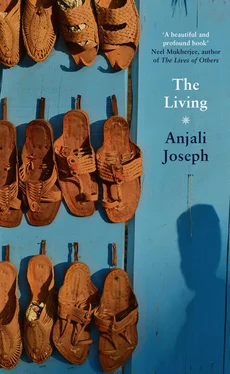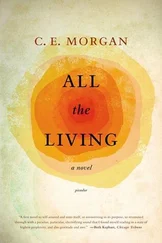We entered the town, old and familiar, its rhythm still gentle despite the new buildings of glass and metal.
*
The house is and isn’t the same. Ten years ago the municipality had a scheme to finance rebuilding houses from before a certain year. My brother saved and borrowed. The house he lives in now is therefore a reimagining of our old house, in the same spot, but made new in concrete. It’s more comfortable: it even has a bathroom. Yet it’s lost the presence of the old house.
In the afternoon, when I’d rested, I was sitting on the bench at the back, facing the yard. This patch of land used to be the limit of the known world. I saw the corner, in which there were now other pukka houses, but where there had been trees, a ditch, and a gap through which Suresh and I would slip out, on our way to an adventure. The parijatak bush must have gone a long time ago.
My brother sat next to me. He didn’t say anything, but I felt his thoughts around me.
Everything’s ready? I asked.
He nodded. The shamiana, the food, the priest, her clothes, the gifts.
How is she? I said.
Who?
Sangita.
He looked surprised. She’s fine. Why?
I don’t know, I said. I thought of the groom, a nondescript young man, and of my niece, her calm intelligence.
We had to use a matchmaker, he said. I was relieved, it’s been a while. Better get it done quickly, I thought. By Diwali they’ll be settled in their house.
She’ll live in the village?
He nodded.
There was no one educated?
He snorted. You think it’s easy?
No, I said. I mean, I’m sure it’s not.
She has the brains her brother should have had, he said.
If she studied more, I said.
Better to get her married before it becomes a problem.
When we talk now, my brother and I, it’s not as though we’re strangers, but there’s the facade of being men. I still find myself expecting tenderness from him, that he will acknowledge how I feel next to him, which is small, in his shadow. But perhaps he only saw me as an interloper, a nuisance.
Well, now … I said.
Yes. He stood. I’d better see what’s happening, he said. I’ll get them to give you tea.
It was my niece who came with the cup. She smiled and sat down with me. I need to go in a minute, she said.
You’re busy, I said.
She looked as if she wanted to roll her eyes.
So, you’re looking forward to married life? I said.
My tone was teasing, the way anyone might talk to her, except that she and I have always been close.
She looked surprised. I continued to smile.
How could I know what it’s like to be married? she asked.
You’ve seen your parents, your aunts and uncles, your brothers.
She hugged her knees and looked across the yard. Seeing other people is not the same, she said.
I stopped, embarrassed, as though we were talking about sex.
There was a sound from inside, perhaps my sister-in-law calling her.
Seeing an animal in a cage isn’t the same as living in one, she murmured.
What?
She took the cup from me and went in.
I hate weddings. I looked around at the lights, the halwai’s stand, the people in shiny clothes milling in groups. My family as usual had betrayed me. Deepak was smiling and talking to one of his cousins’ wives. I couldn’t see Prakash. Anil was running round with the other children. I was in a corner with a decrepit old man. These days, I attracted them, I suppose because like them I needed a plastic chair to sit on, slightly outside the main scrum.
This one must have come with the groom’s party. I didn’t know him. He sat gazing rheumily into the middle distance, holding a cup of Fanta. He didn’t smell bad, only vaguely of mothballs. The future, I told myself, and felt amused, then appalled, for it was the present.
I crossed my legs, uncrossed them because it’s bad for the back, crossed them again, tried to sit straight, gave up and slumped, feeling, as a person in a chair at the edge of a party does, that no one could see me, but everyone else was somehow there for my viewing.
Suddenly I blinked. This figure coming towards me — he was bald, or nearly, and older too. He looked awful. His shoulders were lopsided, his chest weak and slack, his gait rickety, yet purposeful. I knew him at once. How hadn’t I thought of seeing him? Where had he been all this time?
In a moment, he was bending down to the old man in white. Arun? he said.
Eh, Suresh! I said. He turned when he heard my voice. I was a foot or two behind, slightly in shadow. Oh, he said, trying to disguise his surprise. There you are!
I got up hastily, pushing the arms of the chair. Here, I said, and grabbed his elbow. Come on.
I piloted Suresh out of the wedding area and towards, I didn’t know where, but the back of the yard. He didn’t protest.
You thought that was me? I said. You’re incredible.
He giggled. I nearly slapped him hard, like in the old days.
Eh? I persisted.
They said you were in the back sitting down, he said. I haven’t met you in years. Don’t take it too seriously. You always thought too much.
You — I tried to hit him but he laughed and moved away.
It’s good to see you, Arun, he said.
It’s good to see you too, I said. Though I can’t see anything. Where are we going?
There’s still an exit here.
We were back in the old place. But our bolthole was now between two pukka houses. Some of the scrub was there. It smelled the same: a little medicinal, a little chemical. I felt as natural as though I’d been slipping down this narrow gully for the last fifty-five years. In dreams perhaps I had.
Where are we going, re? I asked.
Not too far, he said.
We walked along the road, which was dark, he leading with his bandy gait and I following, stumbling, cursing. How far is it? I said. I’ll tell you the truth, I haven’t been well. I was in hospital for a couple of days, not too long ago.
That’s what they told me, he said. But you look all right, much better than –
Than that old man you thought was me?
He laughed his wheezy laugh. I would have looked at another man his age, crumpled, his remaining hair wispy and mad, and his little face wrinkled, and found him absurd, pathetic, and he was, but nothing had changed. Certain loves slip into us before we are able to weigh things up.
But how much further is it, I said. This is really –
Just here, he said. The track divided into three. We took the left side and after a while we came to a small car mechanic’s shop. Just a minute, Suresh said.
He disappeared around the back of the shop and reappeared to call out, Arun! Come.
What’s this fellow up to now, I grumbled. But I followed, stumbling on the uneven ground. A machine to check the air pressure of tyres stood in the moonlight, leaning over, a sleeping sentinel.
Suresh had found two plastic chairs and was sitting on one. Here, he said with a grin. He also had a bottle, and near it a rag. I threw back my head and laughed. Trouble was on its way towards me, and it was going to be impossible to resist.
So this is where you keep your stash?
The owner is a friend, Suresh said. Sit down.
I sat on the chair. Well, I said, this is better than the wedding. Although we can’t stay long. I must get back before anyone thinks about where I am.
I heard the seal of the bottle being broken, and he passed it my way.
Oh, I said. The moonlight fell across the clear plastic, the yellow label, the fluid inside. I smelled solvent, and oranges. I don’t really –
It doesn’t matter if you normally do or not, Suresh said. Today is today. We haven’t seen each other since whenever, but now we’re both here. You have a drink with me.
Читать дальше
Конец ознакомительного отрывка
Купить книгу











